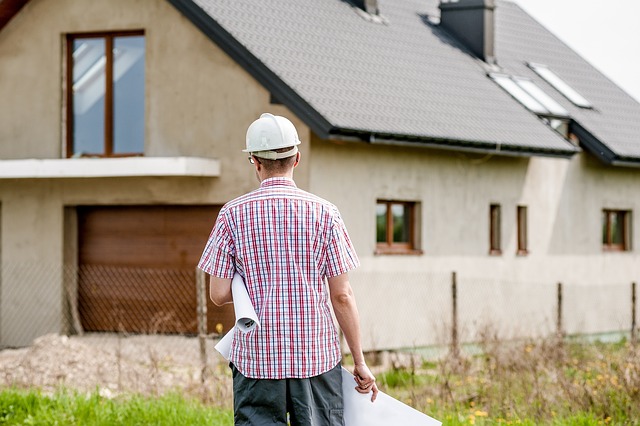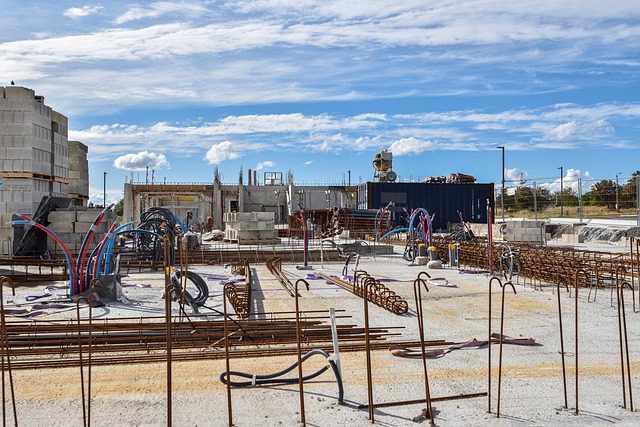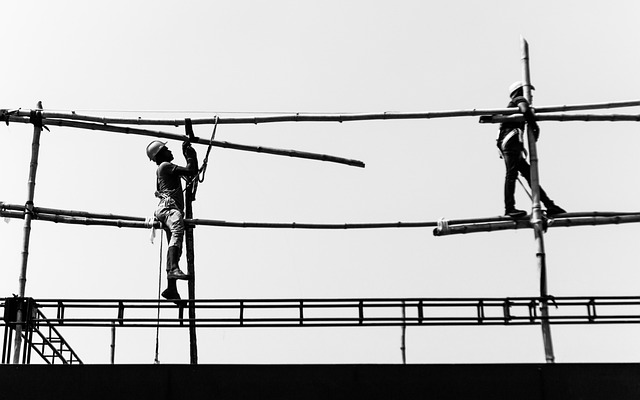Basement leaks, caused by cracked foundations, faulty plumbing, or poor drainage, require professional attention from Foundation Contractors. These experts diagnose issues like soil settlement cracks and water intrusion through advanced techniques. They offer long-term solutions including crack repair, waterproofing membranes, and drainage systems to prevent future leaks. Prompt inspection involving visual checks for signs like mold, warped walls, and water stains is crucial before repairs. Collaborating with Foundation Contractors ensures a dry, secure basement environment by addressing root causes and providing comprehensive protection.
Basement Leak Repair: A Comprehensive Guide by Foundation Contractors
Basement leaks are not just an annoyance; they can be a serious threat to your home’s structural integrity and your peace of mind. Understanding common causes, assessing damage, and choosing the right repair methods are crucial steps in addressing this issue effectively. This guide, tailored by foundation contractors, offers a detailed journey from identifying sources like cracked foundations or faulty plumbing to implementing temporary fixes versus long-term solutions. Learn how to prepare, choose materials, and prevent future leaks through expert advice on maintaining proper drainage and sealing cracks.
# Basement Leak Repair: A Comprehensive Guide by Foundation Contractors

Basement leak repair is a crucial task that requires expertise and precision, especially when handled by professional Foundation Contractors. These specialists are equipped to address the root causes of basement leaks, whether it’s due to cracked foundations, faulty plumbing, or dense soil conditions. By understanding the various indicators of a leak, such as water stains on walls, musty odors, or bubbling floors, homeowners can take proactive measures before the problem escalates.
Engaging Foundation Contractors for basement leak repair offers several advantages. They employ advanced techniques and materials to fix cracks in foundations, ensure proper drainage systems around your home, and implement effective waterproofing solutions. With their expertise, you’ll not only mitigate current leaks but also prevent future ones, safeguarding your basement and entire home from potential water damage.
<section id="understanding-common-causes-of-basement-leaks“>
Understanding Common Causes of Basement Leaks

Basement leaks are a common problem for many homeowners, often leading to significant damage and costly repairs. Understanding the root causes is an essential first step in addressing and preventing future issues. One of the primary reasons for basement leaks is an unsound or compromised foundation. Over time, the soil around your home can settle unevenly, causing cracks to form in the foundation walls. These cracks can allow water to seep into the basement, leading to persistent leaks.
Foundation contractors often diagnose these problems and recommend appropriate solutions, such as repairing or replacing broken parts of the foundation or installing products that divert water away from the structure. Another common cause is inadequate waterproofing. Many homes lack proper waterproofing membranes or coatings on their basement walls, making them vulnerable to moisture intrusion during heavy rainfall or snowmelt. Addressing these issues involves professional waterproofing services that create a barrier between the basement and potential water sources, ensuring a dry and safe living space below ground level.
– Explore typical sources of basement leaks, such as cracked foundations, faulty plumbing, and poor drainage systems.

Basement leaks are a common problem that can arise from various sources, often leading homeowners to seek help from Foundation Contractors. One of the primary culprits is a cracked foundation—a result of settling or shifting soil beneath your home. These cracks can allow water to seep in, causing extensive damage if left unaddressed. Another frequent cause is faulty plumbing, such as burst pipes or blocked drains, which can lead to sudden and severe flooding in basement areas.
Poor drainage systems around your property also contribute significantly to basement leaks. Rainwater that fails to drain away properly due to clogged gutters or insufficient slope away from the foundation can create pressure that forces water into cracks and openings. Prompt identification of these issues is vital to prevent further damage and ensure a dry, safe basement environment.
<section id="assessing-the-scope-of-damage“>
Assessing the Scope of Damage

When dealing with a basement leak, assessing the scope of damage is crucial before initiating any repair work. This initial evaluation involves identifying the source and extent of water intrusion. Foundation contractors often recommend inspecting for signs like mold growth, warped walls or floors, and persistent puddles or moisture buildup. These indicators can reveal whether the leak originates from cracks in the foundation, faulty plumbing, or other issues requiring specialized attention.
During the assessment, it’s also important to consider the age and material of your basement structure. Different construction materials have varying resistance to water damage, and older foundations might be more susceptible to leaks due to settling or shifting over time. Foundation contractors can provide valuable insights into these factors, helping you understand the best course of action for effective and lasting leak repair.
– Learn how to inspect potential leak areas, including walls, floors, and ceilings, to determine the extent of water intrusion.

When addressing basement leak repair, the first step is thorough inspection. Start by examining walls for any cracks or bulges, as these could indicate structural damage or water intrusion from nearby pipes or sewers. Check floors and ceilings for signs of water stains, mold growth, or warping, which can be indicators of persistent leaks. Foundation contractors often recommend regular visual checks for any changes in the basement’s condition, especially after heavy rainfall or seasonal weather shifts.
Paying close attention to these details is crucial as it helps in identifying the source and extent of the leak. Once potential problem areas are pinpointed, you can begin to devise a repair strategy that may involve sealing cracks, replacing damaged materials, or addressing underlying structural issues with the help of foundation contractors. Early detection and intervention can prevent further damage and costly renovations down the line.
<section id="temporary-fixes-vs.-long-term-solutions“>
Temporary Fixes vs. Long-Term Solutions

When dealing with a basement leak, it’s crucial to differentiate between temporary fixes and long-term solutions. While a quick patch or bucket placement might stop immediate water ingress, these are not sustainable options. Foundation contractors emphasize that addressing the root cause is key to preventing future leaks. A temporary fix could delay the discovery of more severe issues like cracked foundations, inadequate drainage systems, or improper waterproofing, which often require extensive repairs.
Investing in long-term solutions offers a more permanent fix and significant cost savings over time. This includes professional assessments, advanced waterproofing techniques, improved drainage systems, and sometimes structural repairs. By collaborating with experienced foundation contractors, homeowners can ensure their basement is adequately protected against water intrusion, thus preserving the space’s usability and preventing further damage to possessions and the building’s structure.
